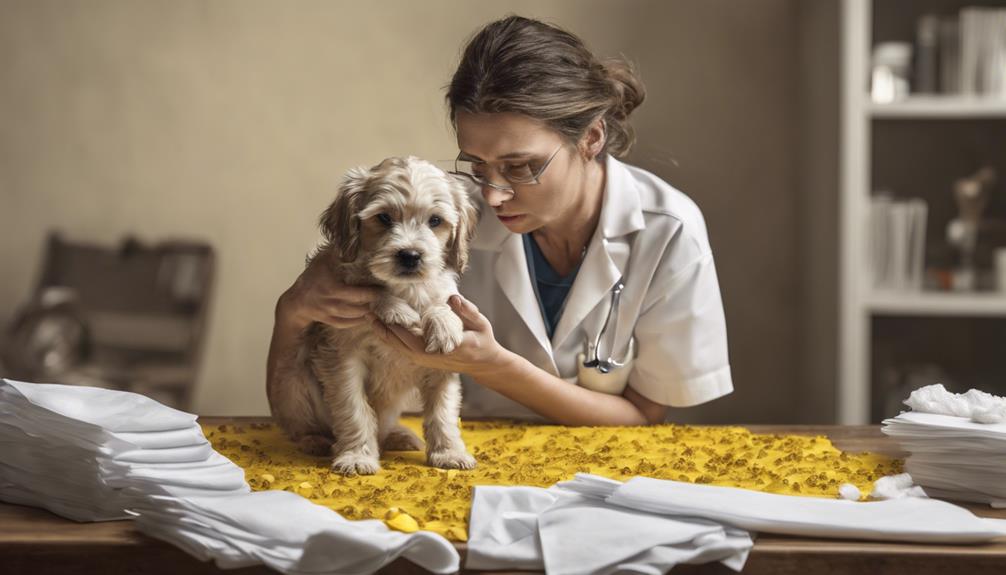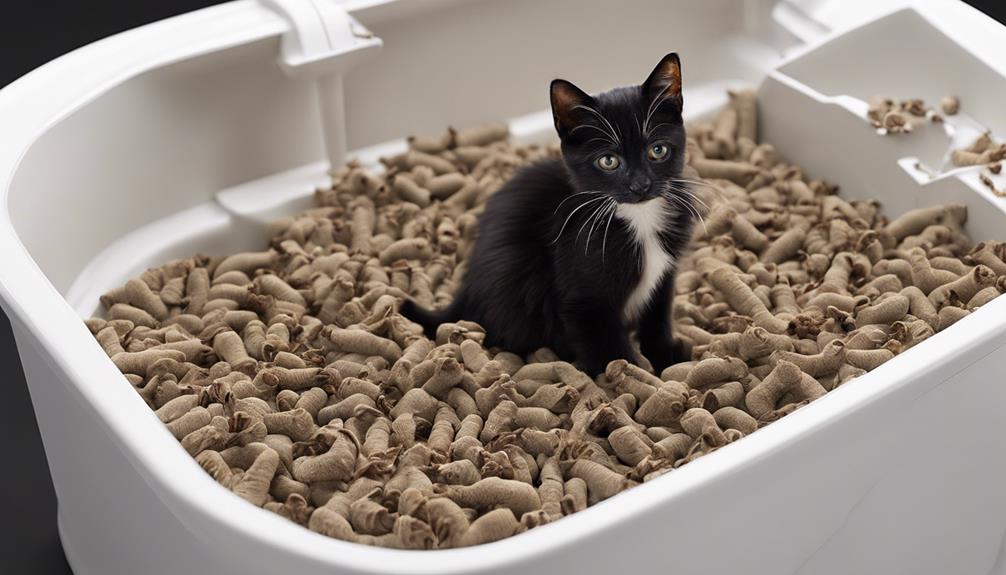Imagine finding your newborn puppy's poop to be a shade of yellow instead of the usual brown. While this may raise concerns, understanding the reasons behind this change is important for their well-being.
From dietary factors to potential health issues, the color and consistency of a puppy's stool can provide valuable insights into their health status.
So, what exactly does yellow poop in newborn puppies indicate, and how should you respond to this situation to guarantee their health and happiness?
Key Takeaways
- Monitor stool color and consistency for the puppy's health assessment.
- Understand the role of colostrum and bile in fat digestion.
- Seek veterinary help if yellow poop persists or if the puppy shows signs of distress.
- Ensure a balanced diet for the mother dog and maintain regular monitoring for overall health.
Possible Reasons for Yellow Puppy Poop
Consuming colostrum, a high-fat diet, and the presence of bile from the liver are common reasons why newborn puppies may have yellow stool.
Colostrum, the first milk produced by the mother, is rich in nutrients but can sometimes lead to soft, yellow stool in puppies. Additionally, the high-fat content in the milk they consume can also cause their stool to appear yellow in color.
Bile, a digestive fluid produced by the liver and stored in the gallbladder, plays an important role in fat digestion and the absorption of essential vitamins in puppies. When bile is present in the intestines, it can give the stool a yellow hue.
Understanding these factors can help puppy owners better comprehend why their furry companions may have yellow poop and make sure they provide adequate care and attention to their digestive health.
Handling Yellow Puppy Poop

When handling yellow puppy poop, it's important to monitor the stool consistency and color to track the puppy's health and detect any potential issues early on.
Yellow puppy poop can be a result of colostrum consumption, which is high in fat and contributes to the yellow color. The bile produced by the liver aids in fat digestion and vitamin absorption, leading to the yellow hue in puppy stool.
It's normal for newborn puppies to have soft, yellow stool due to their diet and digestive system development. Regularly checking the stool can provide valuable information about the puppy's health status.
If yellow puppy stool persists or is accompanied by other concerning symptoms such as lethargy or loss of appetite, consulting a vet for proper evaluation and care is recommended. Ensuring the puppy's health through vigilant monitoring and prompt veterinary consultation is essential for their well-being.
Understanding Puppy Digestive System
Understanding the puppy digestive system is essential for ensuring their overall health and well-being from an early age. Newborn puppies rely on mother's milk, particularly colostrum, to receive essential antibodies vital for protection. Initially, puppies can't digest solid food and extract necessary nutrients from the high-fat content present in the milk. Bile, produced by the liver and stored in the gallbladder, plays a pivotal role in fat digestion, contributing to the yellow color often observed in their stool. It's normal for stool color to shift from dark green to light brown to bright yellow as puppies grow.
Monitoring stool consistency, color changes, and digestive development is paramount to understanding a newborn puppy's health status. Any deviations from the normal digestive process can indicate underlying issues that may require attention. By staying attentive to their digestive system, we can ensure the well-being and proper development of newborn puppies.
When to Seek Veterinary Help

In cases where a puppy's yellow poop persists for more than a day or two, it's advisable to consult a veterinarian for guidance. When it comes to our furry friends, their well-being is our top priority, and seeking veterinary help is critical in certain situations. Here are some key indicators that signal the need for immediate professional assistance:
- Signs of Distress, Lethargy, or Dehydration: If your puppy displays these symptoms alongside yellow stool, it's important to get them checked by a vet promptly.
- Runny Stools: Puppies with persistent runny yellow stools may require medical attention to rule out infections or underlying digestive issues.
- Monitoring Overall Health: Regularly monitoring your puppy's overall health and behavior can help you identify any concerning trends early on and determine when it's necessary to seek professional veterinary care.
Prevention and Future Care Tips
To guarantee the ongoing well-being of your newborn puppy, it's imperative to implement preventive measures and future care strategies. Monitoring the puppy's diet is essential; avoid sudden changes to prevent yellow stool issues. It's equally important to make sure the mother dog's diet is balanced to support healthy puppy stools.
Consulting with a vet about probiotics or digestive supplements can help maintain ideal stool color and consistency. Establishing a regular deworming schedule, as recommended by the vet, is key to preventing gastrointestinal issues in newborn puppies.
Keeping a detailed record of the puppy's weight, feeding schedule, and stool observations will enable you to track any changes and address them promptly. Remember, maintaining ideal stool quality is crucial for your puppy's health.
Frequently Asked Questions
What Does It Mean When a Newborn Puppy Is Pooping Yellow?
When a newborn puppy is pooping yellow, it usually indicates the presence of bile from the gallbladder, aiding in digestion. This yellow color might result from colostrum consumption or the natural progression of their digestive system.
How Do You Deal With Newborn Puppies Poop?
We address newborn puppies' poop by monitoring stool consistency, color, and consulting a vet for persistent issues. Adjust feeding and consider probiotics under vet guidance. Care for mother dog is pivotal. Prompt attention to stool changes promotes newborns' health.
What Does Healthy Newborn Puppy Poop Look Like?
Healthy newborn puppy poop appears soft and yellow, indicating a well-functioning digestive system. The color, rich in fat, owes its hue to bile aiding in digestion. We monitor stool to track their health as their systems mature.
How Do You Treat Yellow Diarrhea in Puppies?
We treat yellow diarrhea in puppies by addressing diet, ensuring hydration, and introducing probiotics. Monitoring stool changes is important. If symptoms persist, seeking veterinary advice is recommended for proper diagnosis and treatment to guarantee the puppy's health.
Conclusion
To sum up, when it comes to handling yellow puppy poop, remember that 'an ounce of prevention is worth a pound of cure.'
By understanding the reasons behind it, taking proper care of the puppies, and seeking veterinary help when needed, we can guarantee their health and well-being.
Stay vigilant, follow good hygiene practices, and provide a nurturing environment for the little ones to thrive.
Remember, a healthy puppy is a happy puppy!









